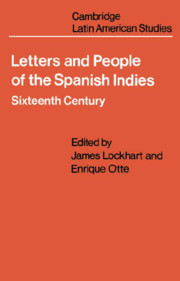Book contents
- Frontmatter
- Contents
- Preface
- Part I Conquest
- Part II The Variety of Life in the Indies
- 11 An encomendero's establishment
- 12 An encomendero's opinions
- 13 The miner
- 14 Commerce across the Atlantic
- 15 The professor of theology
- 16 The new arrival
- 17 The tanner and his wife
- 18 The troubadour
- 19 The nephew
- 20 The garden and the gate
- 21 The woman as settler
- 22 The farmer
- 23 The petty dealer
- 24 The Flemish tailors
- 25 The nobleman
- 26 The Hispanized Indian
- 27 Indian high society
- 28 An Indian town addresses the king
- Part III officials and Clerics
- Bibliography
- Index
16 - The new arrival
from Part II - The Variety of Life in the Indies
Published online by Cambridge University Press: 06 August 2018
- Frontmatter
- Contents
- Preface
- Part I Conquest
- Part II The Variety of Life in the Indies
- 11 An encomendero's establishment
- 12 An encomendero's opinions
- 13 The miner
- 14 Commerce across the Atlantic
- 15 The professor of theology
- 16 The new arrival
- 17 The tanner and his wife
- 18 The troubadour
- 19 The nephew
- 20 The garden and the gate
- 21 The woman as settler
- 22 The farmer
- 23 The petty dealer
- 24 The Flemish tailors
- 25 The nobleman
- 26 The Hispanized Indian
- 27 Indian high society
- 28 An Indian town addresses the king
- Part III officials and Clerics
- Bibliography
- Index
Summary
Alonso Morales, tailor, in Puebla, Mexico, to his cousin in Trujillo, Extremadura, 1576
… Imagine that if back there in Spain we got 8 reales for a coat and short cloak, here they give us 32 …
On previous pages we have seen evidence of the fact that private correspondence from the Indies to Spain consisted in good part of propaganda inducing relatives to migration. The appeals take many forms. One of the most characteristic is the letter written by the settler just off the boat. Genuinely struck by the differences between the new land and the old, though not understanding the new things too deeply yet, still missing home and kinfolk sharply, the new arrival perhaps more than others was responsible for creating the image of a land of opportunity, where everything is bigger and better, that same half-truth, half-lie that has been told to people of the old country since there has been migration.
Young Alonso Morales, probably still under twenty, has recently arrived in Puebla in the company of his older cousin, who paid his way from Spain, and he is now working off the debt in his cousin's tailor shop. The picture he paints has elements seen again and again in such letters. Food is good, plentiful, and cheap. Everyone (every Spaniard, that is) has a horse. There is plenty of work, and it is very well paid, three or four times as well as in Spain. Spanish things are scarce and expensive, but since one earns much, one can afford them. The homeland is the reverse, ‘that misery,’ ‘that wretched country,' which is tolerable only for the rich. Such an image of the Indies, enthusiastic but stopping a good deal short of streets paved with gold, was perhaps all the more convincing in its relative solidity and modesty. This particular letter did not fail of its effect, since the recipient brought it to Seville to buttress his application for license to emigrate.
Dear cousin:
Since I know you'll be glad to hear from me, I will write, and by this letter I wish to announce that, bless the Lord, we had such good weather on the sea that you could think sea-voyaging a pleasant pastime; everything went so smoothly it couldn't have been better.
- Type
- Chapter
- Information
- Letters and People of the Spanish IndiesSixteenth Century, pp. 117 - 119Publisher: Cambridge University PressPrint publication year: 1976



